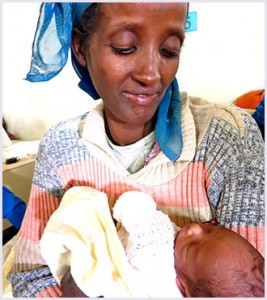
Since Alemi was just 29 weeks pregnant, we decided to try and treat her high blood pressure with oral medication and manage her in the community for as long as possible. She was advised to return to the clinic a week later and told to come to the health centre immediately if she experienced headaches, blurred vision or worsening swollen ankles. Each week Alemi was seen in the health centre but despite her medication being increased, her blood pressure remained dangerously high and the baby failed to grow any bigger. She was therefore taken by car to the hospital, where she was started on a drip with medication to lower her blood pressure and to reduce her risk of having a fit. After a week, however, Alemi’s liver started to show signs of failure and she was not maintaining her blood levels of protein. A difficult choice had to be made; the baby needed to develop further before being born but Alemi’s life was increasingly endangered by the baby remaining inside her. In situations like this, the mother’s life takes priority and so Alemi was given some steroids to reduce the risk of lung disease in the baby, who was to be born via caesarean section the following day.
Just prior to the caesarean section, Alemi’s blood pressure increased to dangerous levels. She also had vast amounts of protein rich fluid in her abdomen, which had been slowly leaking out from her blood over the past few weeks. It became very clear that doing the caesarean section immediately was the right decision and probably saved her life.
Although the baby girl was only 1.4Kg at birth, with careful management of her fluids and maintenance of her temperature, she was soon able to feed from her mother’s breast and after 10 days she put on enough weight to be taken home by her mother and father.
Alemi and her husband told Maternity Worldwide volunteers that they had not previously been able to have a baby that survived because they were too poor to provide a healthy environment. They could not afford any medical treatment or transport to a hospital and they feared that they had little choice but to wait and see what would happen. Alemi walked the 2-hour journey each way to attend our clinic when she heard that we were doing ultrasound scans for pregnant women. She continued to make this journey each week to have her blood pressure checked as she was confident we could provide the help she needed to enable her to have the healthy baby she longed for.
Alemi’s story shows how important it is to provide a range of effective services in order to enable women in often remote rural areas to give birth safely. Maternity Worldwide’s programme of providing maternal health clinics and high quality services in the community ensured Alemi received the help and support she desperately needed. Combined with this we were able to provide transport to the hospital, skilled care while she was there and the finances to pay for this care. This comprehensive programme of maternal health care enabled Alemi to finally give birth safely to a healthy baby.

